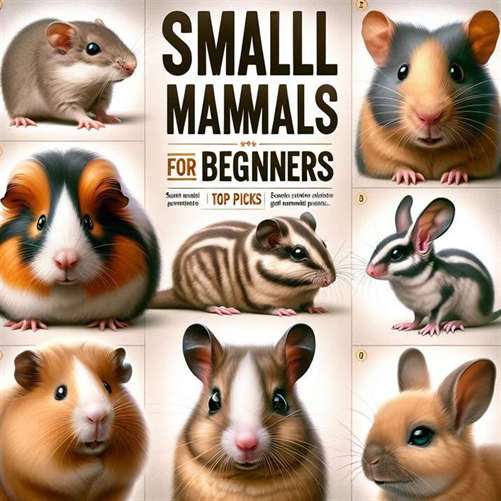Small Mammals for Beginners: Top Picks
Introduction
Are you considering adding a furry friend to your family? Small mammals have become increasingly popular as pets, and for good reason! From their adorable appearances to their engaging personalities, these little creatures offer companionship and joy to many households. In fact, recent studies reveal that small mammals are one of the fastest-growing segments in the pet ownership market. Whether you’re a busy professional or a family with children, small mammals can fit into various lifestyles, making them an excellent choice for many first-time pet owners.
This article aims to introduce you to the world of small mammals for beginners. We will explore different types of small mammals, essential care tips, and how to select the right pet for your home. By the end, you will have a solid understanding of what it takes to welcome one of these charming creatures into your life. If you’re eager to embark on this exciting journey, let’s dive in!
For more pet care insights, be sure to check out our comprehensive guide on care tips for small mammal pets.
What is Small Mammals for Beginners?
Definition
Small mammals for beginners refers to a category of small-sized furry pets that are generally easier to care for than larger animals like dogs or cats. This category includes creatures like hamsters, guinea pigs, rabbits, and ferrets. These pets are known for their relatively low maintenance requirements, making them ideal for individuals or families just starting their pet ownership journey.
Historical Context
The journey of small mammals as pets dates back several decades. Initially, hamsters were one of the first small mammals to gain popularity in homes. As their charm became evident, other species like guinea pigs and rabbits started to enter the pet market. Organizations dedicated to small mammal welfare began to emerge, advocating for responsible ownership and care.
The Importance of Small Mammals for Beginners
Small mammals are increasingly favored by new pet owners for several reasons:
- Low Maintenance: Compared to dogs, small mammals require less daily attention and exercise.
- Space-Savvy: They typically need less living space, making them suitable for apartments or homes with limited room.
- Affordability: Small mammals generally have lower initial and ongoing costs compared to larger pets.
Small Mammals in the Context of Pet Ownership
In the broader category of pet ownership, small mammals play a unique role. They often serve as introductory pets for children, teaching them responsibility and empathy. Additionally, many adults find comfort in the companionship of small mammals, especially in busy urban settings.
Key Players or Contributors
Various breeders and organizations advocate for the responsible ownership of small mammals. These entities often provide resources for new owners, including care guides and support networks. Understanding the contributions of these key players can enhance your experience as a new small mammal owner.
For detailed insights on selecting the right pet, read our guide on choosing small mammal pets.

How Does Small Mammals for Beginners Work?
The Mechanics of Small Mammals for Beginners
Caring for small mammals involves several essential components, including housing, feeding, and socialization. Here’s a breakdown:
- Housing: Small mammals need appropriately sized cages with adequate ventilation. The cage should be equipped with bedding, hiding spots, and chew toys to keep your pet comfortable and entertained.
- Feeding: Each type of small mammal has specific dietary needs. For instance, guinea pigs require vitamin C-rich foods, while hamsters thrive on a mix of grains and fresh vegetables.
- Socialization: Many small mammals benefit from interaction with their owners. Regular handling and playtime can foster a bond between you and your pet.
Technological Foundations of Small Mammals for Beginners
Advancements in technology have made caring for small mammals easier than ever. Here are some tools that can enhance your pet care experience:
- Habitat Kits: These pre-packaged sets often include everything needed to create a suitable living environment for your small mammal, from cages to bedding.
- Feeding Accessories: Automatic feeders and water bottles ensure your pet always has access to food and water, even when you’re busy.
Real-World Applications of Small Mammals for Beginners
Let’s look at some popular small mammals that are perfect for beginners:
- Hamsters: Known for their playful nature, hamsters are nocturnal creatures that are easy to care for and come in various breeds, including Syrian and dwarf hamsters.
- Guinea Pigs: These social animals require companionship, so it’s best to keep them in pairs. They are gentle and can be easily handled, making them great pets for families.
- Rabbits: While they require more space than hamsters, rabbits are affectionate and can be litter trained. They enjoy interacting with their owners and can even learn tricks!
For more information about caring for specific small mammals, check out our detailed guides on hamster pet care and rabbit care essentials.
Benefits of Having Small Mammals for Beginners
Emotional Benefits
Small mammals can provide significant emotional support. Their playful antics and affectionate behavior can lift your mood and reduce stress after a long day. They offer companionship that can be especially comforting for those living alone.
Educational Opportunities
Having a small mammal can serve as an excellent educational opportunity for children. They can learn about responsibility, empathy, and the basic needs of animals. Engaging in their care, such as feeding and cleaning their habitat, can instill valuable life skills.
Interaction and Bonding
Small mammals can be highly interactive with their owners. Their curiosity and playful nature encourage bonding through playtime, training, and handling. Many small mammals enjoy being petted or held, creating a rewarding companionship.
How to Choose the Right Small Mammal for Beginners
Assess Your Lifestyle
When selecting a small mammal, it’s essential to consider your lifestyle. Here are some questions to ask yourself:
- Time Commitment: How much time can you dedicate daily to your pet?
- Space Availability: Do you have enough room for a cage and play area?
- Allergies: Are you or anyone in your household allergic to fur?
Research Different Species
Each species of small mammal has unique care requirements. Research their specific needs, including diet, habitat, and socialization, to ensure you choose one that fits your lifestyle. For instance, if you’re looking for a low-maintenance pet, consider a hamster over a rabbit, which requires more space and time.
Visit Local Shelters or Breeders
Before making a decision, visit local shelters or reputable breeders. Observing the animals in person can help you understand their behaviors and needs. Additionally, adopting from a shelter can be a fulfilling experience, giving a homeless animal a loving home.
For more guidance on selecting the perfect small mammal, check out our post on popular small mammal pet breeds you can own.
Care Tips for Small Mammals for Beginners
Basic Care Essentials
- Feeding: Ensure you provide a balanced diet suited to your pet’s needs. Fresh vegetables, hay, and commercial pellets are commonly recommended.
- Hygiene: Regularly clean your pet’s cage to prevent odors and maintain a healthy environment.
- Health Monitoring: Keep an eye on your pet’s behavior and health. Changes in eating habits or activity levels can be signs of health issues.
Grooming Needs
Many small mammals require grooming to keep their coats in good condition. For example:
- Guinea Pigs: These furry friends need regular brushing to prevent matting.
- Rabbits: Regular grooming helps keep their fur healthy and reduces shedding.
Enrichment Activities
To keep your small mammal stimulated, provide toys and activities. Tunnels, chew toys, and interactive games can help prevent boredom and encourage natural behaviors.
Learn more about essential accessories for your pet in our article on small mammal pet accessories every owner needs.
Future Trends in Small Mammals for Beginners
Increasing Popularity
As urban living becomes more common, the trend of owning small mammals is likely to continue growing. Their adaptability to smaller living spaces and lower maintenance needs appeal to many new pet owners.
Innovations in Pet Products
The pet industry is continually innovating, with new products designed specifically for small mammals. Expect to see advancements in habitat design, feeding solutions, and even health monitoring technologies.
Community Support
With the rise of social media and online communities, new small mammal owners can access a wealth of resources and support. Online forums and groups provide platforms for sharing experiences, tips, and advice, making pet ownership more accessible and enjoyable.
Conclusion
In conclusion, small mammals for beginners offer a delightful and manageable way to enjoy pet ownership. With their charming personalities and relatively low maintenance, they are ideal for first-time pet owners. By understanding their needs, choosing the right species, and providing proper care, you can build a rewarding relationship with your new furry friend.
Whether
Resource Links:
- reddit.com: … Ferrets , ferrets are the best small animal I’ve had & rats were … Best Beginner Pets · Best Unusual Pets · Best Pets to Have · Best Small …
- humanesociety.org: Some people might consider hamsters, guinea pigs and other small mammals as “starter” pets: tools to teach responsibility to their children, …
- reddit.com: … Shrimp? I would say they’re the easiest pet by far, but even they require stable temperature and water parameters, which means setting up a tank …




0 Comments